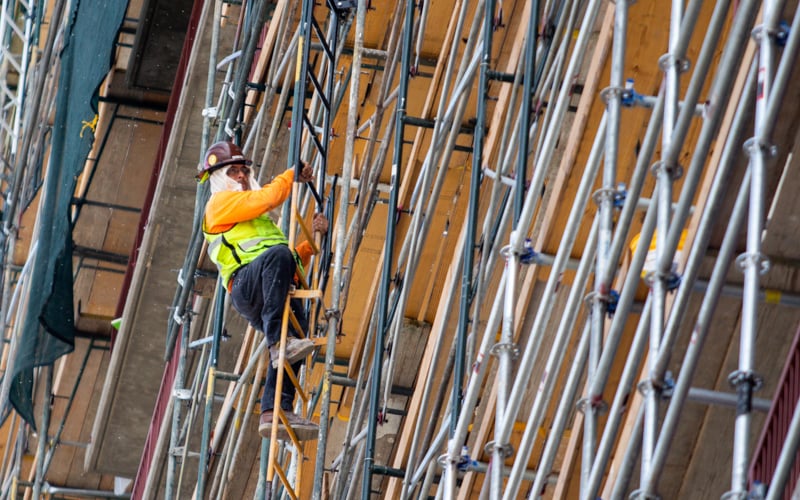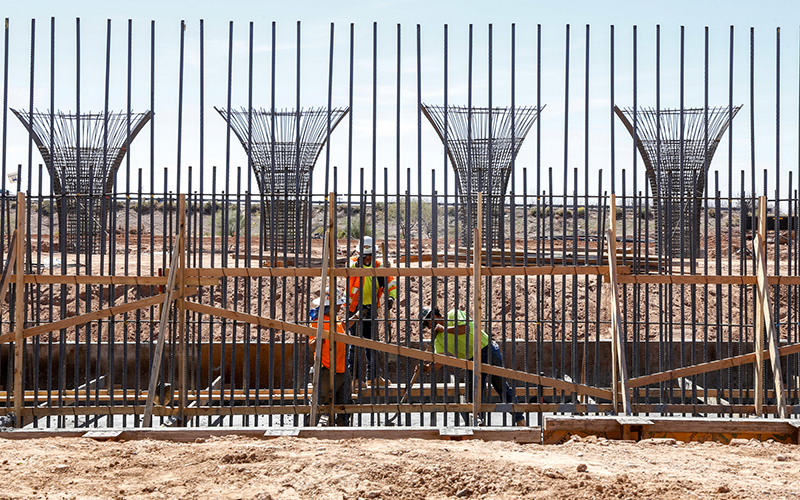
A construction worker works on an apartment building in downtown Phoenix in this 2018 photo. Housing is one of the elements of the Biden administration’s infrastructure that mayors say is desperately needed, and that critics say is wasteful and should not be considered infrastructure. (File photo by Nicole Neri/Cronkite News)
WASHINGTON – Tempe needs “continued and increased” federal funding for affordable housing and public transit, Mayor Corey Woods said Tuesday, telling a Senate panel that local investment alone cannot do the job.
Woods was one of several state and local officials from around the country testifying to the Senate Banking, Housing and Urban Affairs Committee hearing on infrastructure needs, at a time when Congress and the White House are wrangling over the Biden administration’s $2 trillion spending plan.
Tempe has invested its own money in housing and transportation, Woods said, but it’s not enough to meet the needs of residents without federal help.
“Increased investments in infrastructure would provide the city with an important tool to address the negative economic impacts of COVID-19 and continue to develop our community with a sustainable and smart approach,” Woods said.
But critics called the administration’s American Jobs Plan wasteful, saying that while infrastructure is important, the Biden plan would do too much and leave local government to do too little.
“The Biden administration seems to have lost sight of the fact that the federal role in infrastructure spending has historically been limited,” said Sen. Pat Toomey, R-Penn., who added that states “are currently awash with cash” from previous COVID-19 relief bills.
Toomey said states and local governments are primarily responsible for funding infrastructure. He said that reaching agreement on a bipartisan infrastructure package will only be possible if “we support real physical infrastructure that we pay for with existing funds – without raising taxes or borrowing billions.”
The American Jobs Plan, unveiled March 31 by President Joe Biden, would both raise taxes and fund everything from roads to housing to clean-energy projects – which Toomey derided as Democrats spending “taxpayer dollars on their Green New Deal agenda and other liberal policies.”
Despite the size of his plan, Biden has called it a one-time investment in the economy that would be paid for, without borrowing, by raising the corporate income tax rates. Negotiations between the White House and a group of moderate Republican senators stalled recently, in part because the lawmakers refused to raise taxes Biden has said are needed to pay for the plan.
That opened the door to talks with a second group of negotiators, 10 bipartisan senators that includes Sen. Kyrsten Sinema, D-Ariz. But Sinema said in a statement last week that the new group is pushing for a plan that would be “fully paid for and not include tax increases” – something the president rejected in the earlier discussions.
At Tuesday’s hearing, Lancaster County, Pennsylvania, Commissioner Josh Parsons said that federal spending in response to the pandemic is too much.
“At this point, rather than sending out more money, the better solution would be to get the government fully out of the way and let the economy come roaring back,” Parsons said.
But Sen. Sherrod Brown, D-Ohio, said local officials best know their communities’ needs, and that they need more resources.
“Over and over, I hear the same thing from leaders in places large and small, rural and urban: To attract good jobs, they need more resources,” Brown said. “They need homes their workers can afford, and ways for them to get to work.”
That was echoed by Bozeman, Montana, Mayor Cyndy Andrus, who said prices for apartments and single-family homes in her town have gone up significantly, and that wages are not keeping pace.
“Every week, I hear from business owners in our community who have top-tier candidates turn down job offers because home prices are out of control,” Andrus said. “The people who cannot afford a home in Bozeman are not just hourly workers making $15/hour, but also potential employees with Ph.D.s and salary offers between $75,000 and $100,000 per year.”
While Woods was the only Arizona mayor testifying Tuesday, he is not the only Arizona mayor who has come out in support of the president’s plan.
In an editorial for the Arizona Daily Star this week, Tucson Mayor Regina Romero said the American Jobs Plan “would be transformative for Tucson and communities across the country, rebuilding our nation’s transportation networks, creating millions of good-paying, union and green jobs, prioritizing historically under-invested communities, and re-defining ‘infrastructure’ to encompass basic necessities such as high-speed internet and affordable housing.”
Mesa Mayor John Giles and Phoenix Mayor Kate Gallego have signed on to two separate letters with dozens of mayors from around the country, calling for Congress to take “bold action” on infrastructure, particularly funding for affordable housing.
“America needs this level of support because current federal programs and funding as well as affordable housing supply are not meeting the skyrocketing national housing demand,” said the April 13 letter the two signed from the Mayors and CEOs for U.S. Housing Investment.


